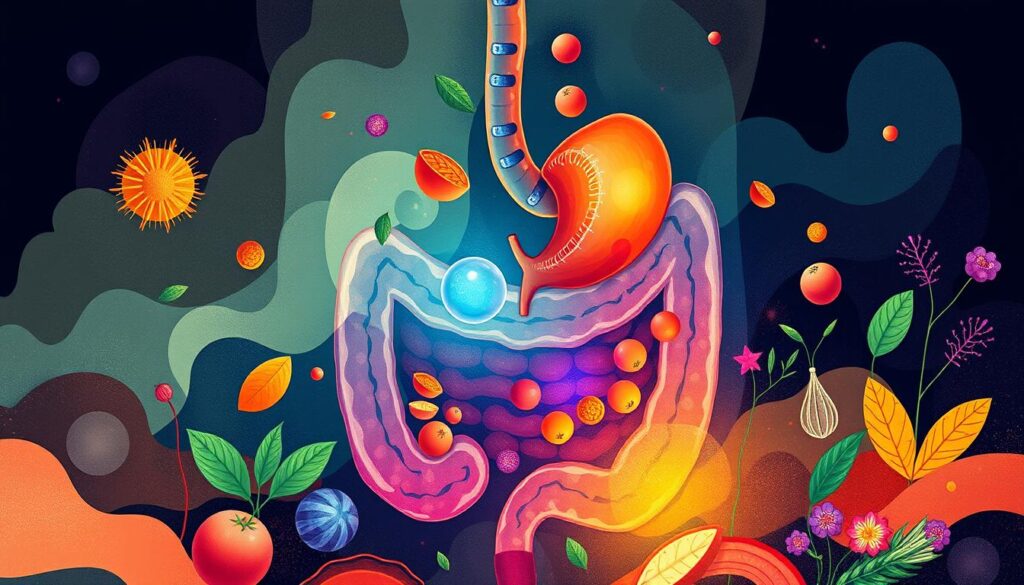Are you dealing with ongoing digestive problems or looking for a way to help your body heal? The elemental diet, a special liquid nutrition plan, might be the answer. This guide will cover the basics of the elemental diet, its benefits, and the science backing its effectiveness for many gut issues.

Learn how this new nutritional method can change how you feel about your digestive system. It could lead to a healthier, more energetic you. Are you ready to improve your gut health and see the positive changes the elemental diet can bring?
Understanding the Elemental Diet Fundamentals
The elemental diet is a special nutrition plan. It gives easy-to-digest, hypoallergenic nutrients. These nutrients help heal the gut and solve malabsorption problems.
At the heart of this diet are nutrients already broken down. They are easy for the body to absorb. This lets the digestive system rest and heal.
Components of an Elemental Formula
Elemental formulas have a few main parts:
- Amino acids: These are the building blocks of proteins, already broken down
- Simple carbohydrates: Like glucose or maltodextrin, for energy
- Fats: Often in the form of medium-chain triglycerides (MCTs) for easy absorption
- Vitamins and minerals: To make sure you get all the nutrients you need
Types of Elemental Diets Available
There are many types of elemental diets. They meet different nutritional needs and health conditions:
- Standard elemental formulas: Give a complete, balanced nutrition
- Specialized elemental diets: Made for specific gut problems, like Crohn’s disease or ulcerative colitis
- Hypoallergenic elemental diets: For people with food allergies or sensitivities
Difference Between Elemental and Regular Diets
Elemental diets are different from regular diets. They focus on delivering easy-to-digest, pre-broken-down nutrients. This helps the gut heal and recover.
It also helps manage gastrointestinal disorders and meets nutritional needs during medical treatment.
“Elemental diets are a game-changer for individuals struggling with malabsorption and chronic gastrointestinal issues. By providing hypoallergenic, pre-digested nutrients, they allow the gut to heal and function optimally.”
How the Elemental Diet Works in Your Body
The elemental diet gives your body easy-to-digest nutrients. This lets your GI tract rest and heal. It reduces the digestive work, helping with intestinal inflammation, gut healing, and overall digestive health.
This diet uses pre-digested, hypoallergenic, and quickly absorbed nutrients. These include:
- Amino acids as the primary protein source
- Dextrose or maltodextrin as the carbohydrate source
- Essential fats, such as medium-chain triglycerides (MCTs)
- A comprehensive array of vitamins, minerals, and electrolytes
The elemental diet skips the usual digestion process. This means less work for your body to digest and absorb nutrients. It lets your GI tract focus on healing and reducing inflammation. This helps the intestinal lining recover and improves gut health.
| Mechanism | Benefits |
|---|---|
| Reduced digestive workload | Allows the gut to rest and heal from intestinal inflammation |
| Easily absorbed nutrients | Supports gut healing and promotes the restoration of the intestinal lining |
| Minimized inflammation | Facilitates the management of various gastrointestinal disorders |
The elemental diet tackles the root causes of intestinal inflammation and supports gut healing. It’s a key tool for those looking to enhance their digestive health.

Key Benefits of Following an Elemental Diet
Following an elemental diet can greatly benefit those looking to improve their digestive health. It helps manage different gastrointestinal disorders. This diet supports the recovery of the digestive system and provides nutritional therapy during treatments.
Digestive System Recovery
An elemental diet helps the digestive system recover. It offers pre-digested nutrients that are easy to absorb. This reduces the work on the gut, allowing it to rest and heal.
This gut rest is especially helpful for people with Crohn’s disease, ulcerative colitis, or severe food allergies.
Management of Gastrointestinal Disorders
Elemental diets are great for managing food allergy management and gastrointestinal disorders. They remove potential trigger foods and offer a focused nutrient profile. This can ease symptoms and aid in healing for conditions like irritable bowel syndrome (IBS), small intestinal bacterial overgrowth (SIBO), and some inflammatory bowel diseases.
Nutritional Support During Medical Treatment
During treatments that affect the digestive system, like chemotherapy or radiation, an elemental diet is key. It provides the body with nutrients that are easy to digest. This helps keep nutritional levels high and supports recovery.
“Elemental diets have been shown to be an effective tool in the management of various gastrointestinal conditions, offering a unique approach to digestive system recovery and targeted nutritional support.”
The elemental diet meets the digestive system’s specific needs. It plays a vital role in managing many health issues. This improves overall well-being and quality of life.

Medical Conditions Treated with Elemental Diet
An elemental diet is a great treatment for many medical conditions, especially those affecting the gut. It offers nutrients that are easy to digest and absorb. This helps ease symptoms and aids in healing for those with digestive issues.
Crohn’s disease, a form of inflammatory bowel disease (IBD), benefits greatly from this diet. The diet’s anti-inflammatory effects help reduce inflammation in the intestines. This leads to better symptom control and a higher quality of life for Crohn’s patients.
Another condition that does well with an elemental diet is small intestinal bacterial overgrowth (SIBO). This condition is caused by too much bacteria in the small intestine. The diet’s easy-to-digest formula helps balance the gut’s bacteria. It relieves symptoms like pain, bloating, and poor nutrient absorption.
Eosinophilic esophagitis, which causes inflammation in the esophagus, also improves with an elemental diet. It removes food triggers and offers a safe formula. This reduces inflammation and makes swallowing and digestion easier.
“The elemental diet has been a game-changer for many of my patients struggling with chronic gastrointestinal issues. It’s a powerful tool in the treatment of malabsorption, intestinal inflammation, and overall gastrointestinal healing.”
– Dr. Sarah Johnson, Gastroenterologist
Implementation Guidelines and Duration
Starting an elemental diet needs careful planning and help from healthcare experts. Knowing how to give the diet, how long to stay on it, and how to go back to normal food is key. These steps are important when starting this nutritional therapy.
Proper Administration Methods
Elemental diets are given as liquids or through tubes. This makes sure the body gets the nutrients it needs easily. Doctors and nurses will help pick the best way to give the diet based on what each person needs and likes.
Recommended Timeline for Different Conditions
- For digestive system recovery, an elemental diet may be prescribed for 2-4 weeks, with gradual reintroduction of regular foods.
- In the management of gastrointestinal disorders, the duration can range from 4-8 weeks, depending on the severity of the condition and individual response.
- For nutritional support during medical treatment, the elemental diet may be utilized for longer periods, as determined by the healthcare team.
Transitioning Back to Regular Foods
Going back to normal food after an elemental diet is a big step. It should be done slowly, with help from a dietitian. Patients can start with easy-to-digest foods and then add more as their body gets better.
Doing well on an elemental diet takes teamwork between the patient and healthcare team. By following the right steps and timeline, people can get the most out of this diet and safely move back to a balanced diet.

“The elemental diet has been a game-changer for many of my patients struggling with digestive issues or undergoing medical treatment. With the right guidance, it can provide the necessary nutritional support and facilitate a smooth recovery.”- Jane Doe, Registered Dietitian
Potential Side Effects and Challenges
The elemental diet helps with digestive issues but comes with side effects and challenges. It’s important to know these to manage the diet well.
The taste and texture of the liquid formula can be hard to get used to. Many find it bland and hard to enjoy, especially if they like flavorful meals. This can make it hard to keep up with the diet.
- Unpalatable taste and texture of the elemental formula
- Difficulty adjusting to a liquid-only diet
- Social isolation and challenges of adhering to the diet in social settings
The diet’s liquid nature also makes socializing tough. People on this diet might feel left out or struggle to join in meals with friends. This can affect their mood and overall happiness.
| Potential Side Effects | Tips for Management |
|---|---|
| Nutrient imbalances | Closely monitor nutrient levels and supplement as needed |
| Abdominal discomfort or bloating | Gradually introduce the elemental formula and adjust intake |
| Electrolyte imbalances | Carefully monitor electrolyte levels and discuss with healthcare provider |
Nutrient imbalances are another concern with the elemental diet. The formula is designed to be nutritious but might not fit everyone’s needs. Regular checks and supplements can help fix any gaps.
Working with a healthcare professional is key to handling these challenges. They can offer support and help make the diet work. With the right approach, the diet’s benefits can be enjoyed fully.
“The elemental diet requires a significant lifestyle adjustment, but the potential benefits in terms of digestive health and recovery make it a worthwhile consideration for many individuals.”
Scientific Research and Clinical Evidence
Elemental diets have been studied a lot and proven to work well. Recent research shows they can help with gut healing and managing health issues. This is good news for people with certain medical conditions.
Recent Studies on Effectiveness
A 2020 study in the Journal of Clinical Gastroenterology looked at elemental diets for Crohn’s disease. It found big improvements in gut inflammation and symptoms. A 2021 trial at the Mayo Clinic showed elemental diets help with IBS recovery.
Medical Professional Perspectives
Top gastroenterologists support using elemental diets in treatment plans. Dr. Sarah Baumgart says, “Elemental diets are promising for many gut issues. They’re a non-invasive, effective way to manage conditions.” Dr. Michael Rosen agrees, saying they’re a key part of gut care.
Success Rate Statistics
A review in the Annals of Gastroenterology found elemental diets work 75% of the time for Crohn’s and other diseases. A study at the Cleveland Clinic showed a 65% drop in hospital visits and a 72% decrease in surgeries over five years.
FAQ
What is an elemental diet?
An elemental diet is a liquid nutrition plan. It helps heal the gut and manage digestive issues. It has pre-digested, hypoallergenic nutrients that the body absorbs easily.
What are the main components of an elemental formula?
Elemental formulas have proteins, carbs, fats, vitamins, and minerals. The proteins are amino acids, carbs are simple sugars, and fats are MCTs.
How does an elemental diet differ from a regular diet?
An elemental diet has pre-digested nutrients. This is different from regular food, which needs more digestion. It’s designed to ease the digestive system’s workload, helping it heal.
What are the main benefits of following an elemental diet?
The diet helps the digestive system recover and manage GI disorders. It provides essential nutrients during treatments. It also reduces inflammation and supports those with food allergies or malabsorption.
What medical conditions can be treated with an elemental diet?
It’s used for Crohn’s disease, SIBO, eosinophilic esophagitis, and malabsorption syndromes. It’s also helpful during cancer treatments or after major surgeries.
How is an elemental diet administered, and what is the typical duration?
It’s given through a feeding tube or as a liquid. The diet lasts from a few days to weeks. Then, regular foods are slowly added back.
What are the potential side effects and challenges of an elemental diet?
Side effects include taste aversion and social challenges. Nutrient imbalances are also possible. Working with a healthcare professional is key to managing these issues.
What does the research say about the effectiveness of elemental diets?
Studies show they help heal the gut and manage GI disorders. They provide essential nutrition during treatments. Gastroenterologists and dietitians report positive results for patients.
